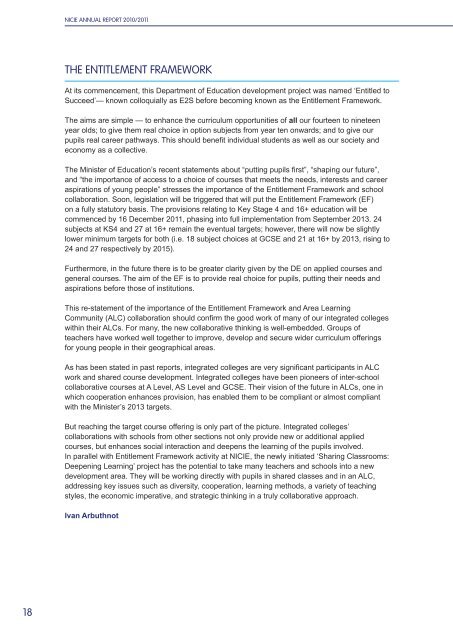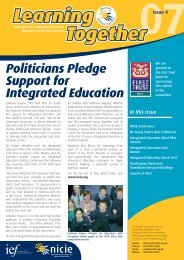NICIE Annual Report 2010/2011 - Northern Ireland Council for ...
NICIE Annual Report 2010/2011 - Northern Ireland Council for ...
NICIE Annual Report 2010/2011 - Northern Ireland Council for ...
You also want an ePaper? Increase the reach of your titles
YUMPU automatically turns print PDFs into web optimized ePapers that Google loves.
18<br />
<strong>NICIE</strong> ANNUAL REPORT <strong>2010</strong>/<strong>2011</strong><br />
THE ENTITLEMENT FRAMEWORK<br />
At its commencement, this Department of Education development project was named ‘Entitled to<br />
Succeed’— known colloquially as E2S be<strong>for</strong>e becoming known as the Entitlement Framework.<br />
The aims are simple — to enhance the curriculum opportunities of all our fourteen to nineteen<br />
year olds; to give them real choice in option subjects from year ten onwards; and to give our<br />
pupils real career pathways. This should benefit individual students as well as our society and<br />
economy as a collective.<br />
The Minister of Education’s recent statements about “putting pupils first”, “shaping our future”,<br />
and “the importance of access to a choice of courses that meets the needs, interests and career<br />
aspirations of young people” stresses the importance of the Entitlement Framework and school<br />
collaboration. Soon, legislation will be triggered that will put the Entitlement Framework (EF)<br />
on a fully statutory basis. The provisions relating to Key Stage 4 and 16+ education will be<br />
commenced by 16 December <strong>2011</strong>, phasing into full implementation from September 2013. 24<br />
subjects at KS4 and 27 at 16+ remain the eventual targets; however, there will now be slightly<br />
lower minimum targets <strong>for</strong> both (i.e. 18 subject choices at GCSE and 21 at 16+ by 2013, rising to<br />
24 and 27 respectively by 2015).<br />
Furthermore, in the future there is to be greater clarity given by the DE on applied courses and<br />
general courses. The aim of the EF is to provide real choice <strong>for</strong> pupils, putting their needs and<br />
aspirations be<strong>for</strong>e those of institutions.<br />
This re-statement of the importance of the Entitlement Framework and Area Learning<br />
Community (ALC) collaboration should confirm the good work of many of our integrated colleges<br />
within their ALCs. For many, the new collaborative thinking is well-embedded. Groups of<br />
teachers have worked well together to improve, develop and secure wider curriculum offerings<br />
<strong>for</strong> young people in their geographical areas.<br />
As has been stated in past reports, integrated colleges are very significant participants in ALC<br />
work and shared course development. Integrated colleges have been pioneers of inter-school<br />
collaborative courses at A Level, AS Level and GCSE. Their vision of the future in ALCs, one in<br />
which cooperation enhances provision, has enabled them to be compliant or almost compliant<br />
with the Minister’s 2013 targets.<br />
But reaching the target course offering is only part of the picture. Integrated colleges’<br />
collaborations with schools from other sections not only provide new or additional applied<br />
courses, but enhances social interaction and deepens the learning of the pupils involved.<br />
In parallel with Entitlement Framework activity at <strong>NICIE</strong>, the newly initiated ‘Sharing Classrooms:<br />
Deepening Learning’ project has the potential to take many teachers and schools into a new<br />
development area. They will be working directly with pupils in shared classes and in an ALC,<br />
addressing key issues such as diversity, cooperation, learning methods, a variety of teaching<br />
styles, the economic imperative, and strategic thinking in a truly collaborative approach.<br />
Ivan Arbuthnot



